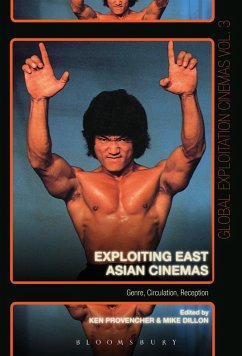
John Hamrick's Blue Mouse Cinemas (eBook, ePUB)
Independent Exhibition and Influence in the Studio Era
Versandkostenfrei!
Sofort per Download lieferbar
93,95 €
inkl. MwSt.
Weitere Ausgaben:

PAYBACK Punkte
47 °P sammeln!
John Hamrick's Blue Mouse Cinemas offers a unique, in-depth case study of regional independent film exhibition in the American Pacific Northwest. Focusing on the silent and early sound periods, this book provides important evidence of the ways an independent entrepreneur, John Hamrick-a charismatic if highly flawed theatre-owner and card-carrying Klansman-could influence Hollywood film culture, as well as exhibition and distribution patterns both within and beyond his region of operation.The Blue Mouse(s) were a set of charmingly same-named theatres that, beginning in 1920, Hamrick built, open...
John Hamrick's Blue Mouse Cinemas offers a unique, in-depth case study of regional independent film exhibition in the American Pacific Northwest. Focusing on the silent and early sound periods, this book provides important evidence of the ways an independent entrepreneur, John Hamrick-a charismatic if highly flawed theatre-owner and card-carrying Klansman-could influence Hollywood film culture, as well as exhibition and distribution patterns both within and beyond his region of operation.
The Blue Mouse(s) were a set of charmingly same-named theatres that, beginning in 1920, Hamrick built, opened, and operated across the Pacific Northwest: in Seattle, Tacoma, Portland, and Astoria. In addition to the Mouses, Hamrick would at various times own, in full or in partnership, dozens of other movie houses across Oregon, Washington, and Idaho. But the Mouses were always his marquee theatres, and ultimately those most closely associated with his theatrical persona, both regionally and within the wider industry.
This book helps us understand the unexplored role and influence of American indie small-chain exhibitors as they continually balanced local and national interests in the name of profitably providing entertainment. The Blue Mouse theatres were part of a well-networked commercial web working across this previously unstudied region. By considering this phenomenon, we can begin to more fully grasp the limits and possibilities of independent exhibition at the height of the studio era, and how the multivalent forces of regionalism intersected with the wider film industry.
The Blue Mouse(s) were a set of charmingly same-named theatres that, beginning in 1920, Hamrick built, opened, and operated across the Pacific Northwest: in Seattle, Tacoma, Portland, and Astoria. In addition to the Mouses, Hamrick would at various times own, in full or in partnership, dozens of other movie houses across Oregon, Washington, and Idaho. But the Mouses were always his marquee theatres, and ultimately those most closely associated with his theatrical persona, both regionally and within the wider industry.
This book helps us understand the unexplored role and influence of American indie small-chain exhibitors as they continually balanced local and national interests in the name of profitably providing entertainment. The Blue Mouse theatres were part of a well-networked commercial web working across this previously unstudied region. By considering this phenomenon, we can begin to more fully grasp the limits and possibilities of independent exhibition at the height of the studio era, and how the multivalent forces of regionalism intersected with the wider film industry.
Dieser Download kann aus rechtlichen Gründen nur mit Rechnungsadresse in A, D ausgeliefert werden.













